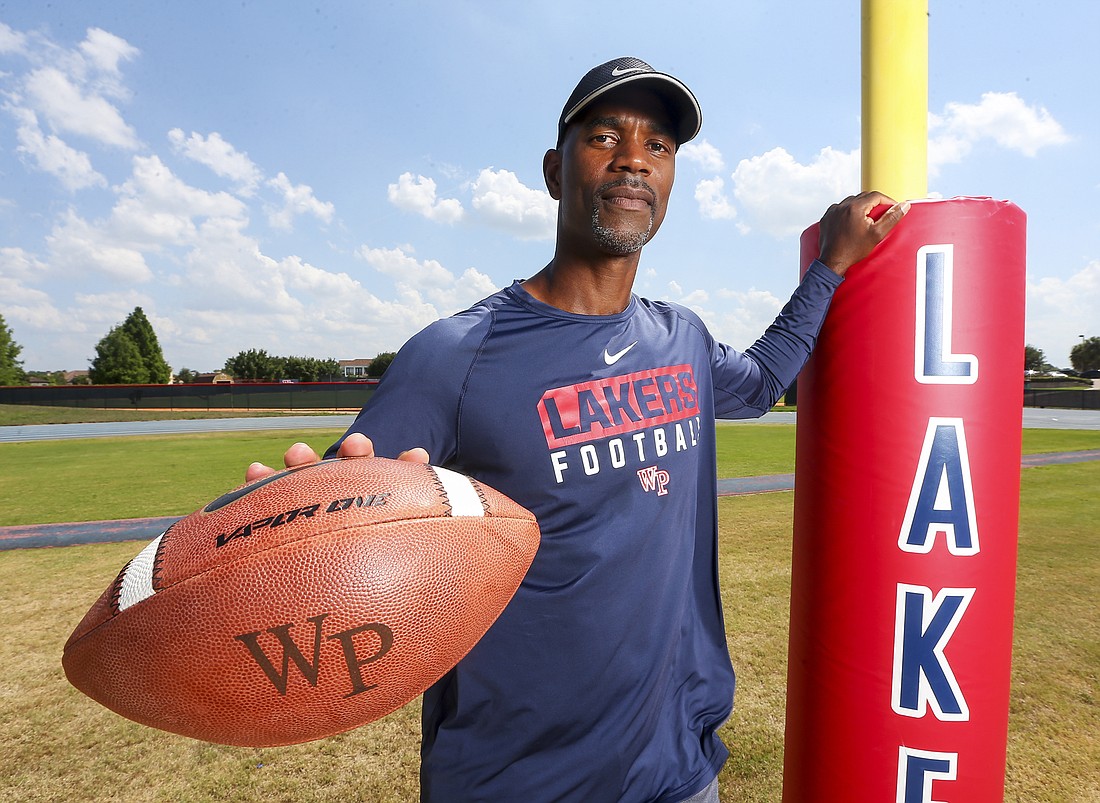- December 22, 2024
-
-
Loading

Loading

On the football field at Windermere Prep, Brian Simmons runs some of the football program’s younger athletes from one side of the field to the other.
For the last two weeks, Simmons — now the head coach of the Lakers — has been working with his team through several practices as spring football is well underway, and although it’s far from his first, it’s definitely a new experience.
After joining Windermere Prep in 2016 under former head coach Jacob Doss, Simmons worked his way from linebackers coach and defensive coordinator to his new role as the head coach — which he assumed in December 2020.
“What I believe in is teaching from the ground up, so teaching the fundamentals and foundations of football,” Simmons said. “Whether you’re playing Pop Warner, middle school, varsity, college or pros, those foundational things shouldn’t change, so that’s where we kind of start practice at.
“Just because a kid played for us one or two or three years, it doesn’t matter,” he said. “We’re approaching the start of spring ball as if a kid has never played football before. I think that is what you do: You don’t take anything for granted. I tell my coaches, ‘Let’s not tell our kids what to do, let’s teach them what to do,’ and there is a significant difference between the two.”
To understand Simmons’ coaching approach to football, you have to go back to his time as a football standout at New Bern High School in his hometown of New Bern, North Carolina.
There, the talented defensive player — who also played basketball, baseball and track at the school — found success under head football coach Chip Williams, the man who helped shape how Simmons approaches the game today.
“He has, probably, the most influence over my coaching and kind of my coaching style than anybody,” Simmons said. “He was a tough, hard-nosed guy who treated every player — I don’t care if you were the first player or the last player on the roster — the same.
“He expected the most out of his players, and to be honest, the better player you are, the probably harder he was on you,” he said. “I’m kind of the same way, but I also like to joke around and have fun with my kids, because I always tell, them, ‘Listen, this is high school football. If you can’t have fun now, when will you ever be able to have fun in life?’”
After graduating, Simmons maintained that notion of taking the game seriously while also having fun at the University of North Carolina. There, he was a four-year letter-winner on the football team, a team captain for the 1996-97 season and a consensus first-team All-American.
Simmons’ success for the Tar Heels led the linebacker to be drafted by the Cincinnati Bengals in the first round of the 1998 Draft as the 17th selection. He played for the Bengals until 2006 before finishing his career with the New Orleans Saints in 2007.
During those years in the NFL — and in the years after as a scout for the Jacksonville Jaguars — Simmons’ idea of having fun while being serious was further cemented into his understanding of the game. It also helped him better separate what each level of football was really meant to represent for a player.
“It is high school football — it’s not the NFL,” Simmons said. “I’ve been to both. One is purely a business and purely a profession, and the other one — which is high school football — should be about representing your high school, playing with your friends, and going out on Friday nights and having fun.”
Although he has had several years with the Lakers, taking over a program is different than working as an assistant, so there have been some adjustments, Simmons said.
“It’s just all the administrative stuff that you have to do — emailing the kids, doing the schedule and just that kind of non-football related stuff, but I already knew that was coming from my days in college and being around a lot of coaches and being a scout,” Simmons said with a laugh. “Everybody thinks they want to go up in football, but the higher you go up in level in the building, the more things you have to handle that’s not related to football, so I understood that part of it.”
Although winning is generally a priority for a lot of coaches going into the new season, for Simmons, it’s more about the journey than the destination. You have to start somewhere before you can go anywhere.
“Winning is at the end of it,” Simmons said. “Everybody says, ‘What’s your goal? To win.’ Well, you tell me how you’re going to win — winning doesn’t just happen. I’m more focused on the process of what we need to do in order to have a chance to win, rather than I am on just winning. I want our kids to have the mindset of, ‘We do what we do,’ and then that will take care of the scoreboard.”